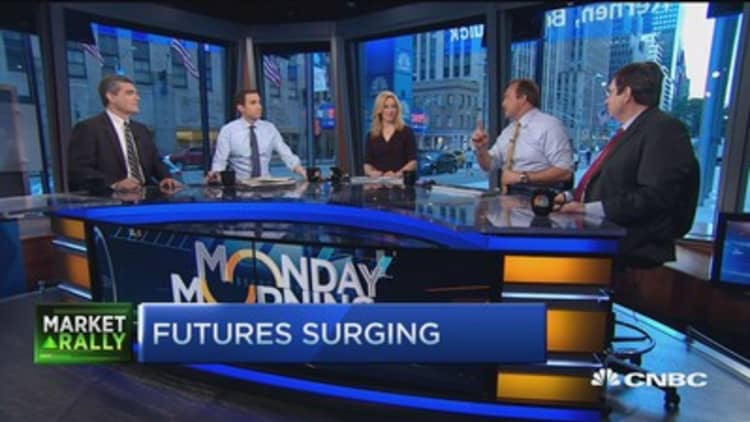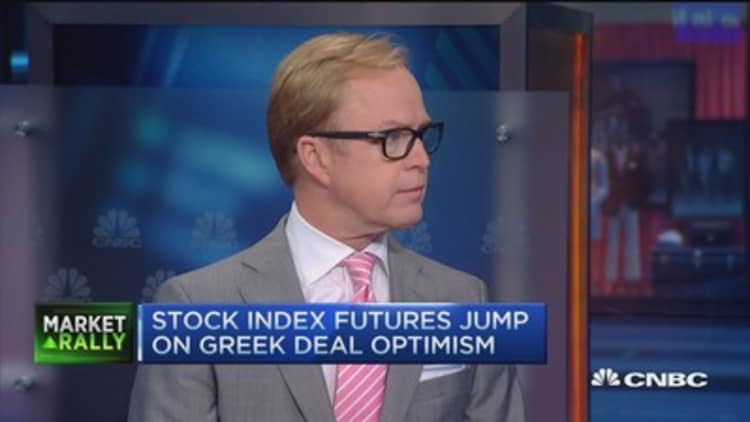


Greece can expect its European creditors to play hard ball in negotiations over its bailout for a simple reason: the prospect of a Grexit just doesn't instill as much fear as it once did, Citigroup's Steven Englander said Monday.
"It's undesirable, but it's not a catastrophe as it would have been in 2011, 2012," the head of Citi Global's G10 FX strategy told CNBC's "Squawk Box." "So I think that they're going to play somewhat hardball and try and get some of these reforms they actually want."
"Greece has a very bad hand right now," he said.
Read More Live Blog: Greece set for crunch talks to avoid default
The European Central Bank's quantitative easing program—and the possibility of expanding it—has tamped down concerns over the ramifications of Greece leaving the European Union, he said. Were Greece to exit, the ECB could use its bond-buying program to protect other peripheral economies who have "played the game."
"Very short term, everybody wants to get to next year," Englander said. "Six months for Greece is a victory, and for Europe, I think that there is this desire to get past the Spanish and Portuguese elections, where many of the same issues could come up again. They don't want to look as though they caved too much."
Jurrien Timmer, director of global macro at Fidelity Investments, also said a Grexit was unlikely to lead to a systemic collapse of the euro zone. He said the Greek debt crisis today is much different than it was in 2011.
"Back then their debt was held by thousands of private investors. Now 80 percent of it is in the hands of public institutions, and with the QE happening in Europe, it's not as contagious as it is to the periphery—to Italy and to Spain and Portugal. "It is a much more contained situation now than it has been in the past."
Read MoreMarkets unprepared for Grexit blood bath: Dallara
Markets rallied Monday as Greece signaled it was willing to make concessions ahead of an emergency summit of euro zone leaders. But shortly before 7 a.m. EDT, European finance ministers indicated proposals submitted by Greece were not substantial enough to convene a summit, and the meeting of the Eurogroup would be pushed off until Thursday.
Timmer characterized Monday's stock surge as a relief rally, saying the had been "in a holding pattern" and "coiling," waiting for a reason to move higher.
Locked out of bond markets and with bailout aid frozen since last summer, Athens is quickly running out of cash. The deputy finance minister on Sunday confirmed Athens had enough money to pay public sector wages and pensions this month.
But Athens also urgently needs access to funds to avoid defaulting on a 1.6 billion euro IMF loan that falls due at the end of the month. As the crisis gets pushed from one meeting to the next, each side has put the responsibility for finding a deal on the other's shoulder.
Money has drained out of Greek banks after a breakdown in talks last weekend, and Greece might have to impose capital controls within days if there is no breakthrough. Sources told Reuters that Greek pre-orders for deposit withdrawals for Monday had already reached 1 billion euros—after savers pulled over 4 billion euros out of their banks last week.
Read More Why it's so hard to predict the impact of a Greek default
The president of Greece's chamber of commerce, Constantine Michalos, told CNBC Monday his country was facing the word national crisis since World War II.
"If we don't get an agreement by the 30th of the month, which signifies the end of the current program, then unfortunately we will have to have fair capital controls, and if capital controls are in place, then it's absolutely catastrophic for the economy, for the market," he said in an interview during "Squawk Box."

One key issue is the retirement age in Greece. The current retirement age for a public sector employee is 56.3. Greek leaders offered to raise that level to 58.5 by 2020 in a previous proposal, but the European Commission would like to see that change happen sooner.
It was not clear Monday whether Greece budged on the issue in the new proposals submitted this weekend.
Read More Global markets soar on hopes of Greek deal
Englander said the retirement level itself is not as critical as Greece's willingness to stick to a deal and its ability to ultimately make its lenders whole.
"The key issue is that Europe has seen them promise structural reforms so many times," he said. "They realize the debt is never going to be sustainable in any sort of agreement."
—Reuters contributed to this story.


